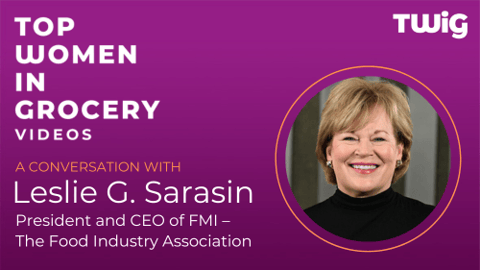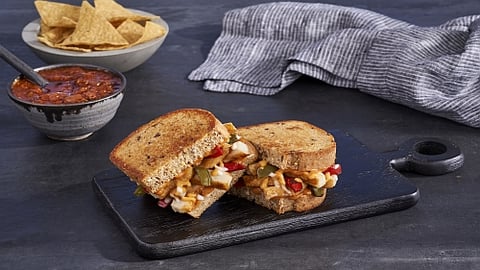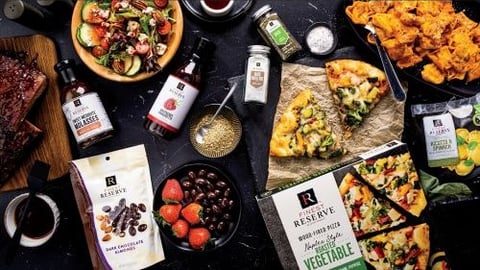Taking the Temperature of the Frozen Foods Market
While temperatures in the Dallas-Fort Worth Metroplex were close to record highs at the time, frozen was the topic of the day at the Frozen IQ event co-hosted by the American Frozen Food Institute (AFFI) and FMI - The Food Industry Association running June 3-5 in Fort Worth. At the event, leaders in the retail, CPG, research, marketing and packaging space highlighted trends and opportunities across the frozen food sector.
According to FMI’s most recent "Power of Frozen in Retail" report, the frozen foods category is gaining steam, ranking fifth behind dry grocery, meat, produce and dairy in total sales. As research shared by market insights firm Circana at the event confirmed, market headwinds, including inflation, are driving trends within frozen, while manufacturers, retailer and other stakeholders are innovating in quality, sustainability and variety.
[RELATED: Prices Varied Considerably Across 10 Key Grocery Categories in Q1]
The Value Priority
One session at the Frozen IQ event focused on winning over value-conscious consumers in the frozen food arena. Suzy Monford, founder and CEO of Food Sport International and former group VP at The Kroger Co. and former CEO at PCC Markets, joined Stacey Fowler, EVP of research and development at Schwan’s Company, and Randy Burt, partner and managing director at Alix Partners, to talk about how retailers and brands can reach price-conscious consumers with frozen product that fit their budget and lifestyles.
Price remains top of mind, as Burt shared data showing that although consumer confidence is higher than it was two years ago, it is still below sentiments during the Great Recession in 2008. “It’s easy to talk about how inflation has moderated, but the level is still elevated from where it was. Food expenditures have grown over the last six years and are outpacing wage growth,” he said. “These are the reasons why the value conscious consumer is so important to win. It’s really affecting every shopper that’s coming in your store and buying your products.”
[RELATED: Progressive Grocer's 75th Consumer Expenditures Study]
Monford agreed. “CPG prices have risen 30% since 2019. When you wrap your head around that, it’s huge. The cumulative effect is really hitting consumers, and retailers are thinking, ‘How do we acquire customers and how do we retain loyalty?’” she said,
Price consciousness is playing out in different ways in frozen foods. The increasing popularity of private label products including frozen foods, is one case in point, as consumers flock to such products to save money. Consumers are also looking got get more out of their money when they do shell out at the store. “The value proposition of frozen offer so such,” said Fowler, citing the success of Schwan’s Asian-style product lines like bibigo that are positioned as premium but affordable.
While price is a major part of the consumer mindset, retailers and manufacturers are also taking a longer-term view as they pull other levers for growth. “Manufacturers are focused on volume and how it will drive market share,” Burt noted.
Zeroing In On Sustainability
A key industry initiative was announced at Frozen IQ, as Sanjay Gummalla, SVP of scientific affairs for AFFI, shared a project in which a group of cold chain stakeholders would test a change from 0° F to 5° F for frozen foods in an effort to conserve energy and save energy costs. Raising the set temperature of the frozen food chain could be historic and impactful step, he declared. “What is going on with products at a warmer temperature? What about quality? What about food safety? Frozen foods that are stored at 5° F will not support the growth of pathogens so we have a head start on food safety,” he explained, adding, “We do have influencing factors and attributes of products that we don’t know about, and that will be a crucial part of this project moving forward.”
In other sustainability news, packaging company ProAmpac shared details about one of its newest sustainable offerings in the frozen market, the paper based RP-1000. The curbside package is suited for frozen foods and can be recycled in both paper and mixed streams, and complements other recyclable frozen food packages from ProAmpac.
Premiumization and Personalization
Another speaker at Frozen IQ, SpartanNash’s EVP and Chief Customer Officer Amy McClellan, expanded on the importance of private label in frozen foods and connecting with consumers to provide them with products that suit their tastes and needs, including at independent stores like the ones SpartanNash works with through its wholesale business.
“I believe that grocers in small communities are driven by purpose, and that’s what’s kept me in the business. We have the opportunity every day to make someone smile and provide surprise and delight value,” said McClellan, who started as a teenage cashier at the family-owned Martins Super Markets in Elkhart, Ind., and steadily worked up in marketing roles. She shared the example of SpartanNash’s new Finest Reserve by Our Family line of premium private label products that includes a variety of frozen options and that has fared well since its launch several months ago.











